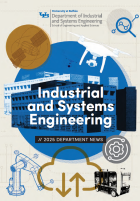UB student researching mass violence prevention wins Society for Risk Analysis award

Ian Unson (right) receives the Student Merit Award from the Society for Risk Analysis during the organization's annual meeting in December in Tampa, Fla. Credit: Department of Industrial and Systems Engineering.
By Tom Dinki
Published February 2, 2023
Ian Unson doesn’t just hope his research will limit the number of casualties when the country’s next mass shooting happens.
He hopes it can prevent mass violence from happening in the first place.
Unson, a second-year PhD student in the Department of Industrial and Systems Engineering (ISE), and his research on protecting public spaces against targeted violence, were recently recognized by the Society for Risk Analysis (SRA). He received the Student Merit Award from SRA’s Security and Defense Specialty Group at the organization's annual meeting in December in Tampa, Fla.
“I am extremely honored,” Unson says. “The amazing work of the other students in contention, as well as past recipients, motivates me to further my research to keep up.”
The award was a recognition of Unson’s soon-to-be-finished paper co-authored with Jun Zhuang, ISE’s Morton C. Frank Professor and an SRA fellow, titled, “A Game-Theoretic Framework for Multi-Target, Multi-Layer Defense Against Strategic Attackers.” It uses operations research and game theory to create a framework for defending soft targets – public, largely unprotected places like schools and places of worship – against attackers such as domestic terrorists and so-called lone wolf gunmen.
Taking input from local school districts, churches and police departments, Unson and Zhuang examined how an attacker would react to changes in a security system. Unson says they plan to confirm their findings in the future through human experiments and machine learning.
“This research can help security agencies improve their responses to mass casualty events,” Unson says. “We hope these improvements in resource allocation and response can minimize casualties or even deter these types of attacks.”
The research is part of the Department of Homeland Security’s Soft target Engineering to Neutralize the Threat RealitY (SENTRY) program. UB is one of the core institutions of the SENTRY Center of Excellence, which was created with a 10-year, $37 million grant in 2021.
The Mass Killing Database by Northeastern University, the lead SENTRY institution, shows there were 42 mass killings in the U.S. last year, the second highest tally since 2006. That included the racist mass shooting at a Buffalo Tops supermarket on May 14 that claimed the lives of 10 people.
And there have already been six mass killings in the first month of 2023.
“The importance of this research is exemplified by the increasing number of shootings in crowded spaces, such as schools and supermarkets,” Zhuang says.
Zhuang credits Unson with coordinating their research meetings and communicating with multiple graduate and undergraduate students.
“Ian is extremely pleasant to work with,” Zhuang says. “He was one of our best undergraduate students prior to joining the ISE PhD program, and he’s very passionate about applying operations research techniques to better protect homeland security.”
Unson, a Rochester native, enjoys using statistics, mathematics and computing software to solve problems.
“I especially enjoy being able to work on real-world problems with actual solutions,” he says. “As interesting as theoretical problems can be, seeing concrete, actionable solutions really inspires my work.”
